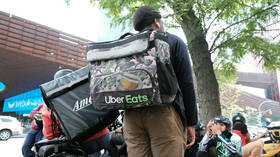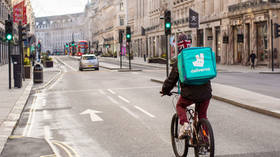Delivery giants lose bid to block wage increase for NYC workers

Food delivery workers in New York City must be paid at least $18 per hour, Acting Supreme Court Justice Nicholas Moyne ruled on Thursday. The decision allows the city’s stalled minimum wage plan to move forward despite a flurry of lawsuits by delivery giants such as Uber, Grubhub, and Doordash.
The ruling reversed a temporary injunction the delivery companies had secured against the plan’s implementation in July, when it was initially scheduled to take effect. Uber, Doordash, and Grubhub must now choose between paying workers at least $17.96 for every hour spent connected to the app, excluding tips and regardless of how many deliveries are made, or paying $0.50 per minute of “active time,” which starts when an employee accepts an order and concludes when it is dropped off.
The ruling did not affect all delivery services equally. New York-based platform Relay, which claims its food deliverers earn more than $30 per hour on average, claimed through a lawyer to have secured the injunction it sought.
Because delivery workers are typically classified as independent contractors, they do not automatically receive some worker protections that companies are obliged to offer to traditional employees, such as worker’s compensation, healthcare and retirement plans, or paid sick leave.
The federal minimum wage of $7.25 applies to all non-tipped workers, including independent contractors. However, food deliverers receive part of their pay in tips, which worker advocates argue allows their employers to hold back on payday, especially when the delivery is paid for using a black-box app rather than cash. Indeed, New York’s 65,000 food delivery workers have only been guaranteed the right to know what amounts customers tip at all since the start of 2022.
The Workers Justice Project, which organized deliverers to secure that concession as well as a requirement that the apps apply for licenses from the city’s Department of Consumer and Worker Protection, hailed Thursday’s decision as proof that “workers will always win.”
“Multibillion-dollar companies cannot profit off the backs of immigrant workers while paying them pennies in New York City and get away with it,” the group’s director, Ligia Guallpa, warned in a statement.
The big three delivery apps have long opposed hiking minimum wages, insisting it would hurt the end consumer by forcing them to pay more. “This law will put thousands of New Yorkers out of work and force the remaining couriers to compete against each other to deliver orders faster,” Uber spokesperson Josh Gold claimed.
Also on Thursday, California, which already requires food delivery apps to pay workers at least 120% of the local minimum wage for active time, announced all 500,000 of the state’s fast food workers must receive a minimum of $20 per hour, starting in April.













